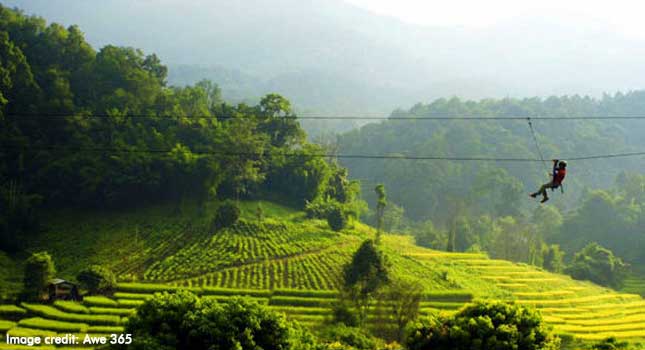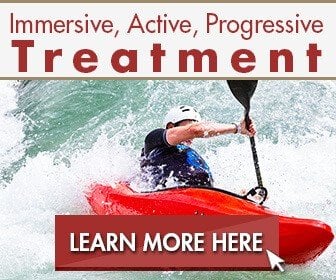The Edge rehab is located in the tropical, forested mountains of Northern Thailand, and nature factors heavily into the addiction treatment that we provide our clients. We’ve found that incorporating the outdoors into treatment profoundly enhances its benefits. Here’s why.

Sharelines
- Take group therapy sessions into the great outdoors.
- We believe nature and the outdoors significantly amplify the benefits of addiction treatment. Here’s why:
Outdoor activities factor heavily into the addiction treatment programme at The Edge. In this post, we’ll take a closer look at a few ways in which we incorporate nature into treatment and offer insight into how these measures help young men overcome addiction.
1. Nature-based Wilderness Excursions are Like Outdoor Group Therapy
Wilderness therapy has been adopted by many behavioural health programmes precisely because they’re so effective – especially with young people.
The fundamentals of addiction treatment in an outdoor setting are the same as they would be indoors. However, instead of joining a subdued group counselling session in which you share experiences, you’re able to connect in a more dynamic setting – whether it’s hiking in the jungle, scaling a rock face or tearing down a campsite.
Wilderness-based therapeutic experiences naturally build teamwork and interpersonal skills. It’s common for those with alcohol or substance abuse problems to have diminished interpersonal skills. Challenging outdoor activities encourage participants to work together as a unit, rekindling their capacity for social interaction. It’s a highly effective way to strengthen early recovery.
At The Edge, wilderness excursions are one of the cornerstones of our innovative treatment model. Our location in the forested moutnains of Northern Thailand allows us to take group therapy sessions into the great outdoors. These excursions develop determination, communication and teamwork. They also foster a stronger sense of independence, self-sufficiency and assertiveness – all of which are useful in battling addiction.
2. Exercising in Nature Helps Your Recovery Progress
For those already in recovery, exercise is a powerful tool that can help them sustain their new way of life. We’ve written before about positive effects of exercise on the brain’s reward centre. It triggers the release of endorphins and other chemicals that produce a pleasant sense of wellbeing. This is an extremely important consideration for anyone with an addicted brain.
Alcohol and other addictive substances are dopamine reinforcers, which means they act on the brain to stimulate the reward centre. The more you use substances, the more accustomed your brain becomes to this specific avenue to dopamine release. This makes quitting all the more difficult, as the brain has to be retrained to derive a sense of reward from other activities and situations.
Exercise provides the brain with precisely this type of support. At a time when its reward centre isn’t operating as it should be, the brain can supplement low dopamine levels with the endorphins produced through even moderate physical exercise. This effectively teaches your brain that there are other ways to stimulate the reward centre without using drugs or alcohol, thus smoothing the transition to recovery.
Exercise routines can also replace destructive addiction patterns that previously ruled your life. In the early days of recovery, it’s common to find yourself at a loss for what to do. So much of your previous life has been spent on your addiction. Without that activity in your life, you get the sense that something is missing.
Developing a consistent workout routine will help you fill that newfound free time. The fact that it also compensates for lost dopamine means your brain is going to appreciate it more, too. You may even find yourself craving a good workout once the routine has become a habit.
We’ve seen first-hand what a powerful role exercise can play in a young man’s recovery. Our clients engage in high-intensity physical training during their time in rehab. Some of the activities, such as muay Thai (Thai boxing) training, can take place indoors or outdoors. Others – like our triathlon training – are best enjoyed outside, in nature. But in either event, the training routines our clients develop become powerful tools for strengthening their recovery.
3. Mindfulness Meditation Is Even Better in Nature
Meditation is another powerful tool for treating addiction and strengthening the recovery process. At The Edge, we train our clients in mindfulness, a particular type of meditation with roots in Theravada Buddhist practice. The version of mindfulness we utilise is not religious in any way. Instead, it focuses on training you to acknowledge and accept your circumstances without judgement or assigning value. This is an important discipline for managing addiction, as it teaches you to become more accepting of who you are and of the world you live in.
Mindfulness can be practised anywhere. We advise our clients to seek out a place free of distraction where they attune their focus to the rhythms of their body and environment. A quiet room is acceptable, but there’s nothing quite as rejuvenating as meditating in nature.
Mindfulness meditation is one of the most powerful brain-retraining tools available to people in addiction treatment. It reduces stress and fosters an overall state of mind that’s conducive to healing. At The Edge rehab, our lush, expansive grounds are ideal for quiet moments of reflection and meditation.
Nature is a Central Component of Addiction Treatment at The Edge
As you can see, we strive to incorporate elements of nature into our addiction treatment services wherever possible. Our idyllic location in the countryside of Chiang Mai enables this approach, and our clients benefit as a result. If you’d like to learn more about our methods and outdoor programming at The Edge, please don’t hesitate to contact us.





